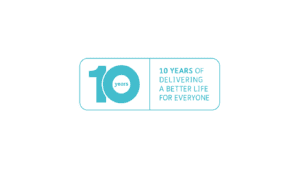Technology is an innovative and interruptive force felt across the world, its application as varied as its interpretation. These interpretations have presented themselves across health and social care, in pursuit of better patient outcomes, productivity and connectivity. Noble aims, but a focus on results can cause us to lose sight of the journey. An especially concerning effect for us in the world of social care. A world where the journey matters far more than the destination.
Lorcán Murray, our Marketing Manager, participated in an industry panel discussion at Care Roadshows Glasgow. Focussed on the importance of balancing technology and human connection. The panel consisted of Quality Compliance Systems Head of Social Care Content Lindsay Rees, Scottish Care’s Technology and Digital Innovation Lead Nicola Cooper, Abbey Court’s Care Home Manager Brian Murray and Activist Peter Hope. A verified buffet of experience and perspectives from which we have drawn these five informative morsels.
Care Technologist
Scottish Care has been working hard to support social care in Scotland and help guide its development and effectiveness. A key part of their support for people engaging with technology in care has been the development of their Care Technologist role. A Care Technologist is someone who helps people trial new technology in their care, and find out what solutions would be the most effective for them. This provides the user with an opportunity to test technology and provide feedback on its effectiveness. An endeavour that firmly roots technology in human experience. Providing a resource for the continued improvement of technological initiatives in social care.
Involve People in the Process
Peter Hope had himself experienced the benefits of working with a Care Technologist when introducing new technology into his life. He also made a point of detailing the value of involving people in each step of the process. The difference between offering someone a cup of tea, and going with them to the kitchen to make it together. Self actualisation is at the heart of care, where dignity is experienced and shared in equal measure for all participants. By involving people throughout the process we, in the words of Scottish Care’s CEO Dr Macaskill, “make room for dignity to flourish,” and avoid the trapping of technological advancement purely for the sake of efficiency.
Establish a Baseline
When people bring technology into their care, or really introduce measures of any kind, it is always with the aim of improving their service. However, a common mistake is waiting for these improvements to show up on the ‘eye test’. Establishing the standard of your service before you introduce new technology is crucial, as it establishes a baseline for you to measure your new initiatives against. Otherwise, you can spend far too long trying to work out the specifics of the success and the shortcomings of the changes you implement.
Change Should be Implemented from the Bottom Up
Where you begin your change is as important as the change itself. While decisions are traditionally made at the top of a company, they will never be successful when said success is determined by their ability to trickle down through your company’s processes and positions. Whether it is new monitoring equipment or management software, it must be implemented from the bottom up to ensure it reaches every part of your service and those who rely upon it.
The Importance of Understanding Why
Finally, and most crucially, the power of Why? With new technology so frequently the focus is on more tangible questions; How do we use this system? Where do we apply it? Who is in charge of it? Throughout the onboarding process of any new technology the most fundamental question that everyone in your company and using your service must know the answer to is: Why?
When people know the purpose of their efforts, when people understand the ambition of the new initiatives that are taking root in vital areas of their lives, it is far easier to implement, understand and benefit from technology. Too often we are told simply how, what, when and where. Ensure everyone involved in your service understands why new technology is being brought in, and your chances of success increase significantly, while your ability to get lost down rabbit holes and in the weeds is considerably reduced. When you know why you started something, you also know when to stop an unsuccessful initiative.
These are our five key takeaways from our time on the panel in Glasgow. A thoroughly enjoyable and informative experience, and one we look forward to undertaking again at Care Roadshows Liverpool on the 25th of May.








